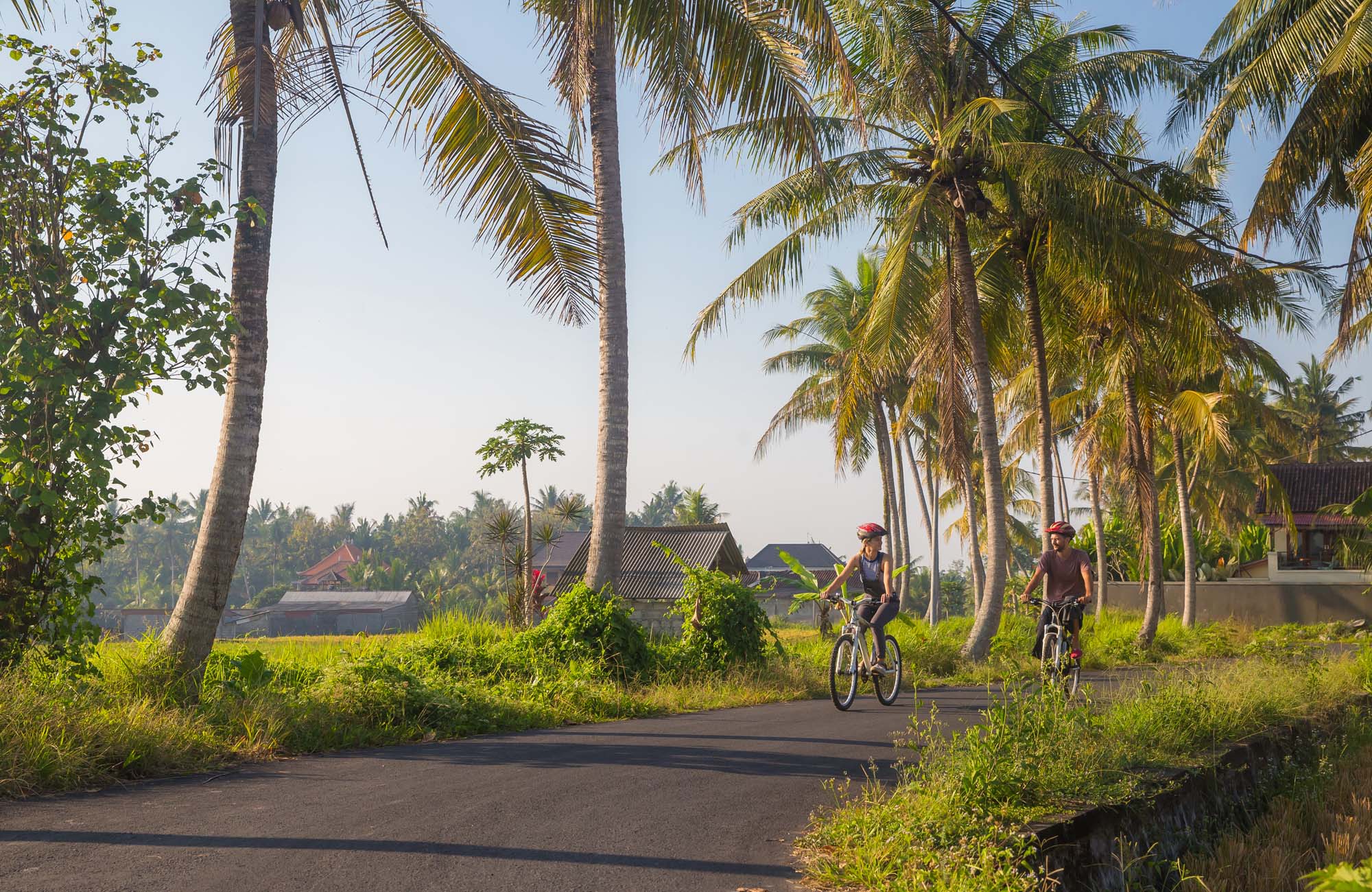Find your best time to travel to Bali and have the trip of a lifetime
What’s the best time to go to Bali? Our month-by-month guide cuts through the clutter to answer this, looking at things like weather trends, crowd sizes, and cost considerations. Expect to find straightforward advice for every type of traveler to help you plan your perfect Bali getaway.
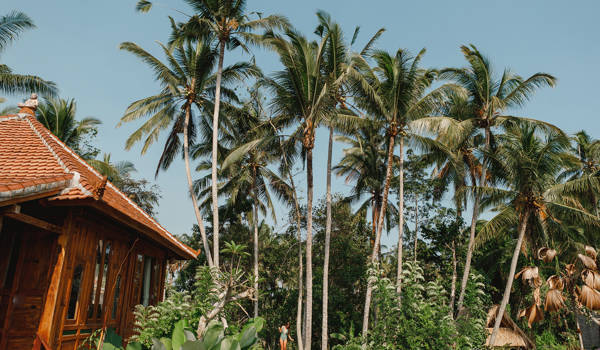
So much to see, so much to do!
Bali has something for everyone, from the bustling streets of Kuta and Seminyak to the serene rice terraces of Ubud and the stunning beaches of Nusa Penida (okay, technically this is not on Bali - but we know you'll all go there!).
You can explore ancient temples, lively markets, and beautiful coastal spots. Check out the breathtaking views from the cliffs of Uluwatu, the waters of Lake Batur, and the lush greenery of the Tegallalang Rice Terraces. And you definitely have to try the food - Balinese cuisine is just so tasty, you can't say no to Soto Babi or some Laklak.
Key Takeaways
- The best time to visit Bali for sunny weather and outdoor activities is during the dry season from April to October, with the most tourists visiting between May and September.
- The wet season from November to March offers a quieter and more affordable travel experience, with cultural highlights like the Balinese New Year in March and lush, vibrant landscapes.
- Timing your visit can make specific activities a lot better, like surfing with ideal conditions from June to August, and the dry summer months being the best for trekking and exploring natural beauty.
Optimal Season for Sunny Skies in Bali
For those dreaming of clear skies and beach days, the dry season from April to October is of course the best time to visit Bali. This period offers consistently good weather, making it ideal for outdoor activities like surfing on the west coast or climbing Mount Batur. The dry season is also when Bali experiences its peak season, as a lot of travellers visit Bali for its unbeatable sunny weather and relaxed but somehow also lively vibe.
April: The Gateway to Sunnier Days
April marks the beginning of Bali’s dry season, offering a welcome break from the rainy season’s last showers. With an average of 9 hours of sunshine per day, April usually has consistently good weather. It’s a great month to visit Bali if you want to enjoy sunny weather without the peak season crowds.
Another advantage of visiting in April is the potential for better deals on accommodations. As a ''in-between'' month, prices often reflect the tail end of the wet season, giving you the best of both worlds—great weather and affordable rates. So if you’re looking to enjoy clear skies and save some money, April is a good time to plan your trip.
May to September: Peak Sunshine and Beach Life
May kicks off the peak of Bali’s dry season, bringing with it the maximum temperatures and great conditions for beachgoers. This period is perfect for sun lovers, with May being the hottest (but not sunniest!) month, averaging 28°C. If you’re looking to soak up the sun and enjoy Bali’s beautiful beaches, this is the time to visit.
August stands out as Bali’s sunniest month, offering an average of 10 hours of sunshine per day. The island is buzzing with activity, from bustling beach resorts to vibrant nightlife. Whether you’re surfing on the west coast or simply lounging by the beach, May to September is ideal for experiencing Bali at its sunniest and most lively.
October's Gentle Transition
As the dry season is slowly coming to an end, October brings a gentle transition with moderate rainfall. While the weather remains generally pleasant, the ebbing tourist traffic makes it a more affordable time to visit. If you’re looking for a balance of good weather and lower prices, October is a great month to consider. October also offers a rich cultural experience with events like the Ubud Writer’s Festival and the Bali Vegan Festival.

Visiting during Bali's Wet Season
While the dry season is often recommended as the best time to visit Bali (and we agree - by the way!), the wet season from November to March has its own charm. The rainy season brings fewer tourists, lower accommodation costs, and the island’s landscapes at their greenest. If you prefer a quieter atmosphere and don’t mind a few rain showers, the wet season can be a wonderful time to visit.
The wet season in Bali offers:
- Lush surroundings
- Amazing views of the Tegallalang Rice Terraces
- A true tropical paradise
- Exploring Bali’s natural beauty without the crowds
- An often more ''local'' feeling
January and February: Embrace the Rain Showers
January is Bali’s wettest month, with the highest rainfall averaging around 90mm. However, this also means fewer tourists and cheaper hotel prices, making it an affordable time to visit. Indoor attractions like visiting temples can provide a retreat from the rain while offering a glimpse into Balinese culture.
February continues the trend of fewer tourists and favourable accommodation deals. The quiet atmosphere allows for a more relaxed experience, whether you’re exploring the famous Monkey Forest or enjoying a traditional Balinese spa day. Embracing the rain showers can lead to unique and memorable experiences.
March's Balinese New Year Celebrations
March is a special time in Bali as it marks the Balinese New Year, known as Nyepi or the Day of Silence. Despite the wet season, Nyepi is a lovely cultural experience with its silence and reflection, followed by loud celebrations. It’s a time when the island comes alive with rituals and festivities, making it a fascinating time to visit.
From the Ogoh-Ogoh parades to the day of silence itself, taking part in Nyepi in Bali is like stepping into another world. The wet season’s rain showers add a mystical touch to these celebrations, making March a great month to visit Bali.

When Bali is Least Crowded
If you’re looking to avoid the crowds and enjoy a more relaxed vibe, the wet season from November to March is the best time to visit Bali. During these months, you’ll find fewer tourists, quieter beaches, and a more laid-back vibe. The lower tourist numbers also mean you can explore popular spots like Ubud and Seminyak without the usual queues and people ruining your perfect shots.
If you've got the chance the shoulder season months of May, June, and September are a perfect balance between the two main seasons, with warm, sunny weather and reduced amounts of travellers. These months are great if you want to experience Bali’s beauty without the peak season crowds. With fewer tourists around, you can enjoy a more local experience.
Low Season Insights
The wet season from November to March is considered Bali’s low season, offering significant advantages for budget-conscious travelers. During this period, hotels and other accommodations often provide substantial discounts, making it a more affordable time to visit.
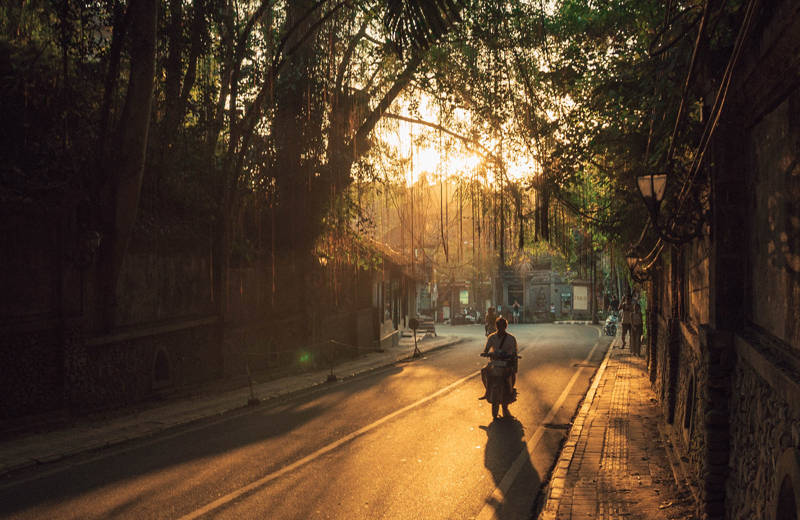
Navigating Bali's High and Peak Seasons
Bali’s high season occurs in July and August, as well as December, aligning with summer vacations and the festive season. During these months, the island sees a surge in tourism, leading to increased prices for flights, accommodations, and activities. The warm and inviting weather, with average temperatures around 27°C, makes it a popular time for visitors.
Navigating the high season requires some planning, but it’s worth it for the booming atmosphere and events going on. From beach parties to cultural festivals, there’s always something happening in Bali during the peak months. Let’s check out the specifics of Bali’s busiest seasons.
July and August: Bali in Full Swing
July and August are the busiest months in Bali, with travellers flocking to the island to enjoy the peak sunshine and warm weather. It’s essential to book your accommodations and activities well in advance to secure your preferred options. Despite the crowds, you can still find good deals by planning ahead.
For those looking to escape the bustle, consider exploring Bali’s less-visited areas like the north coast or the central highlands. These regions offer a more quiet and authentic experience, away from the crowded tourist spots. July and August may be busy, but with a bit of planning (and dare we say it, some KILROY sparkle!), you can enjoy the best of Bali even during its peak months.
Festive Season
The festive season in late December marks another peak period in Bali, drawing visitors from around the world to celebrate Christmas and New Year. The island comes alive with special events, fireworks, and a great atmosphere making sure your Holidays spent here will be memorable.
However, the increased demand during the festive season means higher prices for accommodations and tours. If you plan to visit Bali during this time, it’s wise to book early and be prepared for the festive crowds.
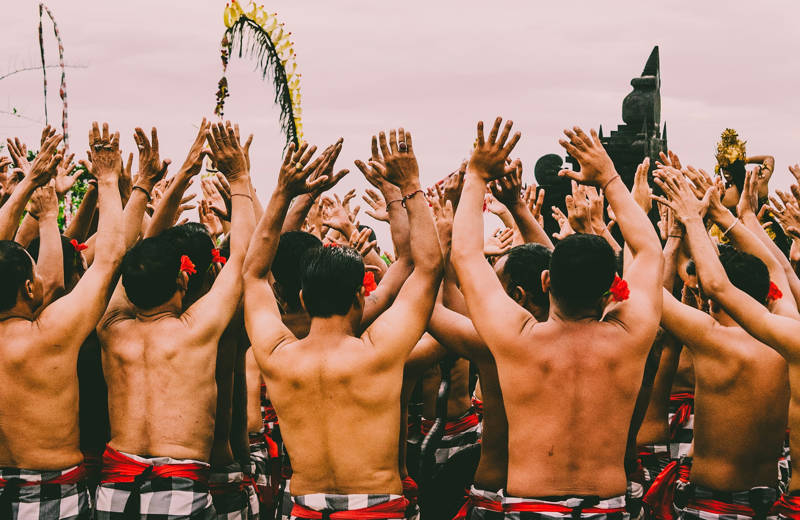
Best Times for Specific Activities in Bali
Bali offers a massive amount of activities for all kinds of travellers, and timing your visit can really improve your experience. For scuba diving, April and October are ideal months due to high visibility and warmer sea temperatures. The dry season from May to September is also the best time for trekking and exploring Bali’s scenic rice paddies.
Surf's Up: Ideal Months for Good Surf
Surfing enthusiasts will find the best conditions on Bali’s west coast from June to August. These months Bali is lucky to get both large swells and strong offshore winds, creating perfect waves for surfing. It matches up with the general peak season, so expect to find lots of surfers looking to catch the best waves. No matter if you’re a beginner or already mastered the board, the west coast’s surfing spots will not disappoint.
Trekking Trails: When to Hike in Bali
The dry season from May to September is the best time for trekking in Bali, offering the best weather conditions for outdoor activities. Climbing Mount Batur is particularly popular during this period, with the most favorable light at sunrise. Multi-day hikes are also best undertaken during these months, making it easier to cope with the weather while exploring all of Bali's stunning nature. Plan your trekking activities during this season to make the most of Bali’s stunning landscapes and not get stuck in rain showers on the way.

There's no such thing as a bad time on Bali!
Visiting Bali is always a great experience, no matter when you choose to visit. Whether it’s the sunny skies and beach life of the dry season or the pretty green landscapes of the wet season, you will have lots to see and do. Getting your timing right can help make the most of your trip to this beautiful island - especially if you're looking for specific activities like surfing, trekking or diving. Luckily - we're the travel experts that can help you out with making the most of your trip. get started by reaching out below!
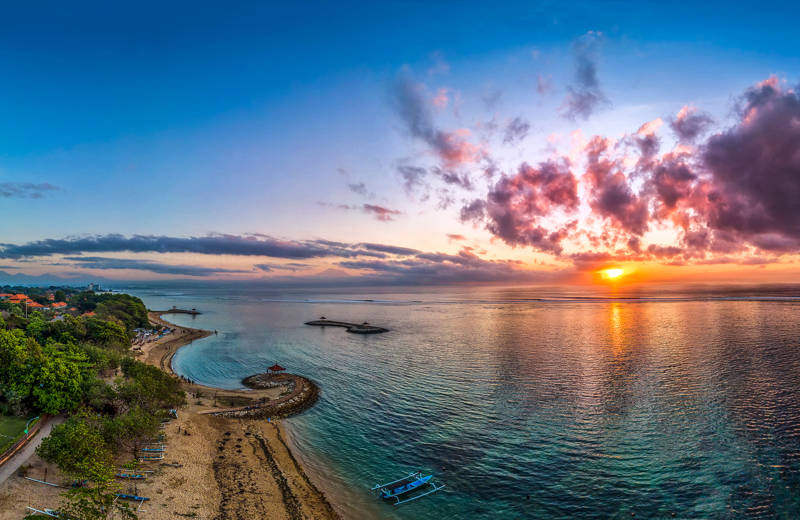
Frequently Asked Questions
What is the best month to go to Bali?
The best time to visit Bali is between May, June, and September as the conditions are warm and sunny, and it's less busy compared to July and August. Enjoy your trip!
What is the rainy season for Bali?
The rainy season in Bali is from October to April, with the heaviest rainfall typically occurring in December and January. It's a great time to experience the lush greenery and vibrant landscapes, despite the occasional downpour.
When is Bali least crowded?
Bali is least crowded during the wet season from November to March and the shoulder months of May and September. Enjoy a quieter experience if you visit during these times.
What are the best months for surfing in Bali?
The best months for surfing in Bali are June to August, when you can find large swells and strong offshore winds for an amazing surfing experience.

